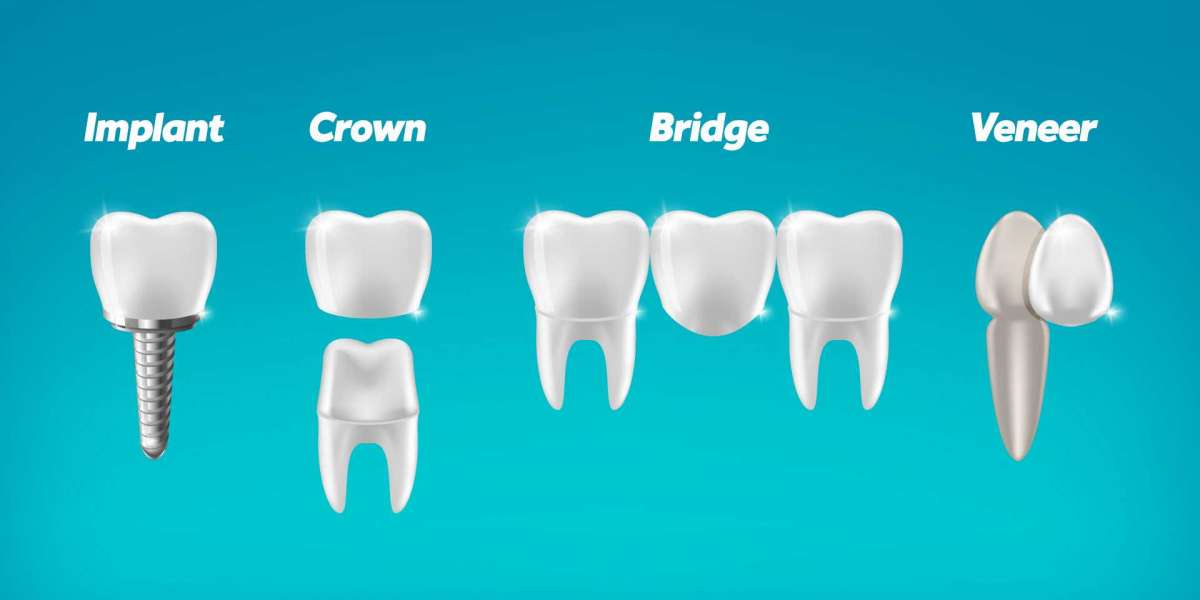Dental prosthetics have revolutionized modern dentistry, offering solutions that not only restore oral function but also enhance the overall quality of life.
From dentures and bridges to crowns and implants, these prosthetics provide a pathway to improved oral health and increased self-confidence.
What Are Dental Prosthetics?
Dental prosthetics are artificial devices used to replace missing teeth or parts of the mouth structure. They come in various forms, including:
- Dentures: Full or partial sets of teeth replacements that help individuals regain their chewing ability and facial aesthetics.
- Dental Implants: Titanium posts surgically placed into the jawbone, topped with a prosthetic tooth, offering a permanent solution.
- Bridges: Fixed dental restorations used to replace one or more missing teeth by anchoring to adjacent teeth.
- Crowns: Caps placed over damaged or decayed teeth to restore their shape and function.
Enhancing Oral Health
1. Restoring Functionality
Missing teeth can make chewing and speaking difficult. Dental prosthetics restore these essential functions, allowing individuals to eat a balanced diet and communicate clearly.
For example, dentures enable individuals to enjoy a variety of foods, ensuring adequate nutrition, while dental implants offer stability similar to natural teeth.
2. Preventing Further Oral Health Issues
Gaps left by missing teeth can lead to shifting of remaining teeth, bite problems, and bone loss in the jaw.
Dental prosthetics help maintain the structure of the mouth, preventing these complications. Implants, for instance, stimulate the jawbone, preventing bone resorption, a common issue after tooth loss.
3. Reducing Risk of Gum Disease
Empty spaces in the mouth can trap food particles and bacteria, increasing the risk of gum disease.
By filling these gaps, dental prosthetics help maintain better oral hygiene. Regular cleaning of prosthetics, such as brushing and soaking dentures, also reduces bacterial buildup.
4. Improving Oral Hygiene
With properly fitting dental prosthetics, brushing and flossing become more effective, reducing the risk of cavities and gum issues.
Crowns and bridges, for example, protect weakened teeth from further decay and enhance overall oral hygiene.
Enhancing Quality of Life
1. Boosting Self-Confidence
A complete, healthy smile significantly boosts self-esteem. Dental prosthetics provide a natural-looking solution for missing teeth, allowing individuals to smile without hesitation.
Studies show that individuals with restored smiles often experience improved mental well-being and social interactions.
2. Enhancing Appearance
Missing teeth can lead to facial sagging and premature aging. Dental prosthetics support facial muscles, maintaining a youthful appearance.
Dentures, in particular, provide volume to the cheeks and lips, enhancing one’s facial profile.
3. Improving Speech
Teeth play a crucial role in speech. Dental prosthetics correct speech issues caused by missing teeth, improving communication.
Well-fitted dentures and implants help articulate words clearly, boosting confidence in social settings.
4. Increasing Comfort
Modern dental prosthetics are designed for comfort, with materials that mimic natural teeth and gums, ensuring a snug and pleasant fit.
Advances in technology have resulted in lightweight and durable prosthetics that feel almost indistinguishable from natural teeth.
5. Facilitating Better Nutrition
The ability to chew a wide variety of foods ensures a well-balanced diet, contributing to overall health and well-being.
Dental prosthetics, such as implants, allow individuals to consume harder foods like nuts and apples, which are essential for nutrition.
Advancements in Dental Prosthetics
Technological advancements have made dental prosthetics more durable, comfortable, and aesthetically pleasing.
Materials like zirconia and porcelain provide strength and a natural look, while 3D printing ensures precise fittings.
Digital impressions reduce discomfort during the molding process, and computer-aided design (CAD) enhances accuracy.
Choosing the Right Dental Prosthetics
Selecting the appropriate dental prosthetic depends on individual needs, oral health status, and budget.
Consulting with a dental professional helps determine the best option, whether it's a removable denture for affordability or an implant for long-term stability.
Maintenance and lifestyle factors also influence the choice of prosthetics.
Conclusion
Dental prosthetics offer more than just a cosmetic solution; they play a vital role in maintaining oral health and enhancing quality of life.
With continuous advancements in dental technology, these prosthetics provide individuals with the opportunity to enjoy a functional, beautiful smile for years to come.
Investing in dental prosthetics not only restores oral function but also brings back confidence, comfort, and joy in everyday life.







